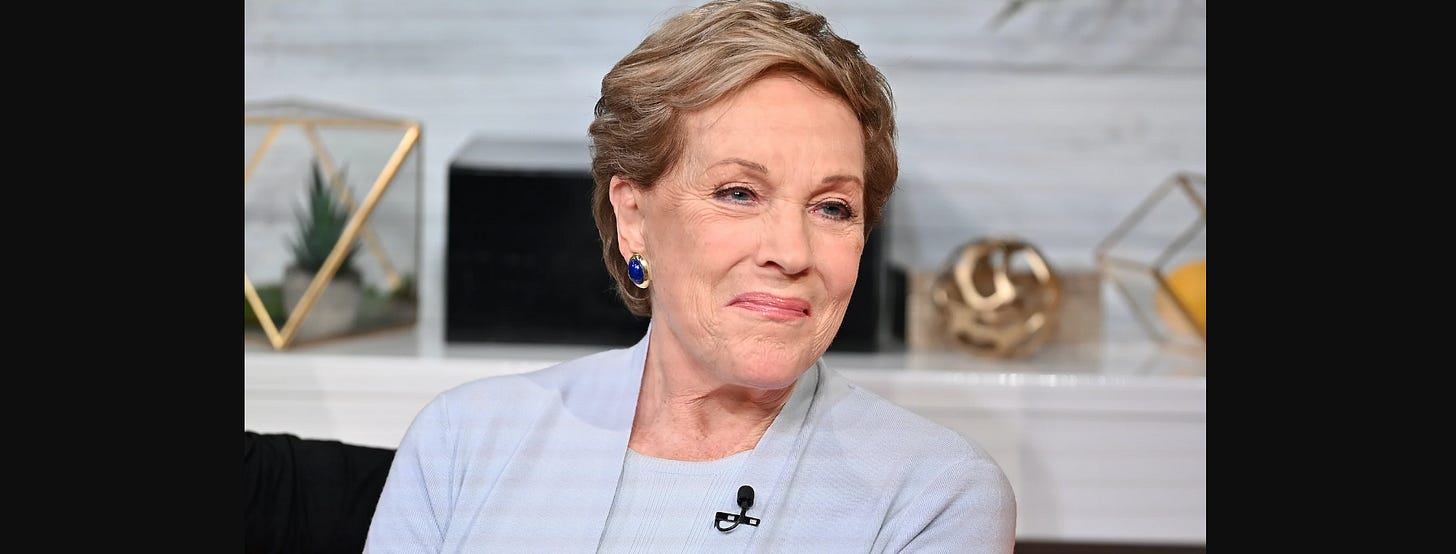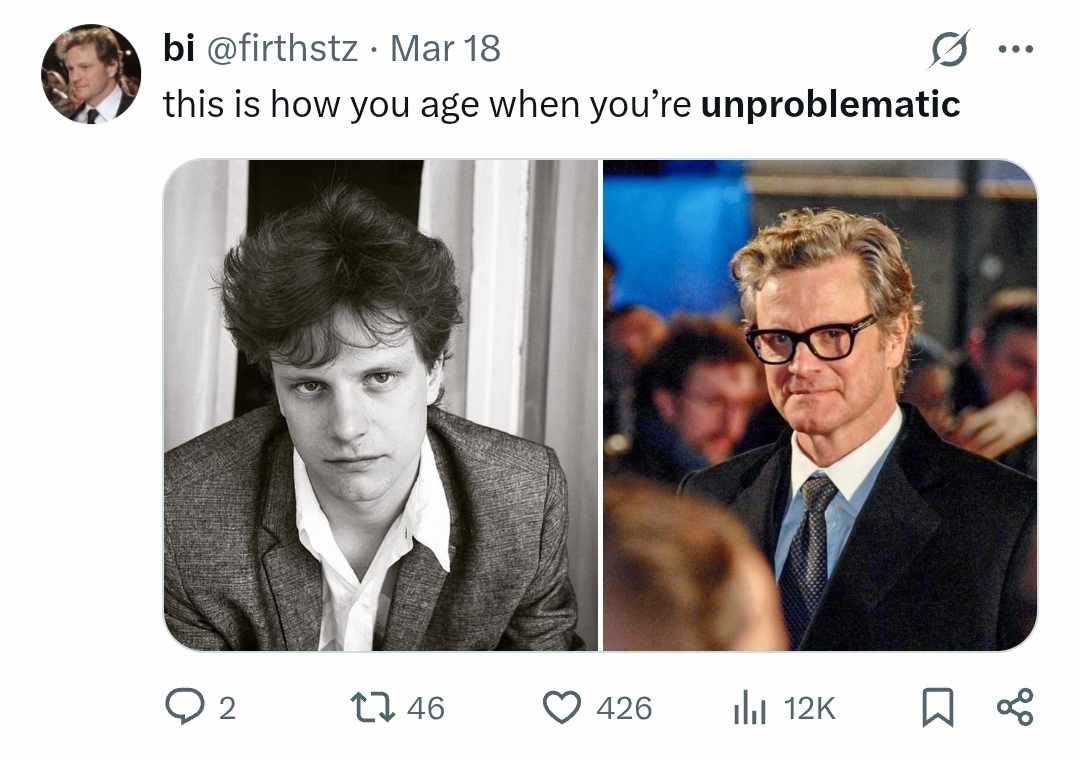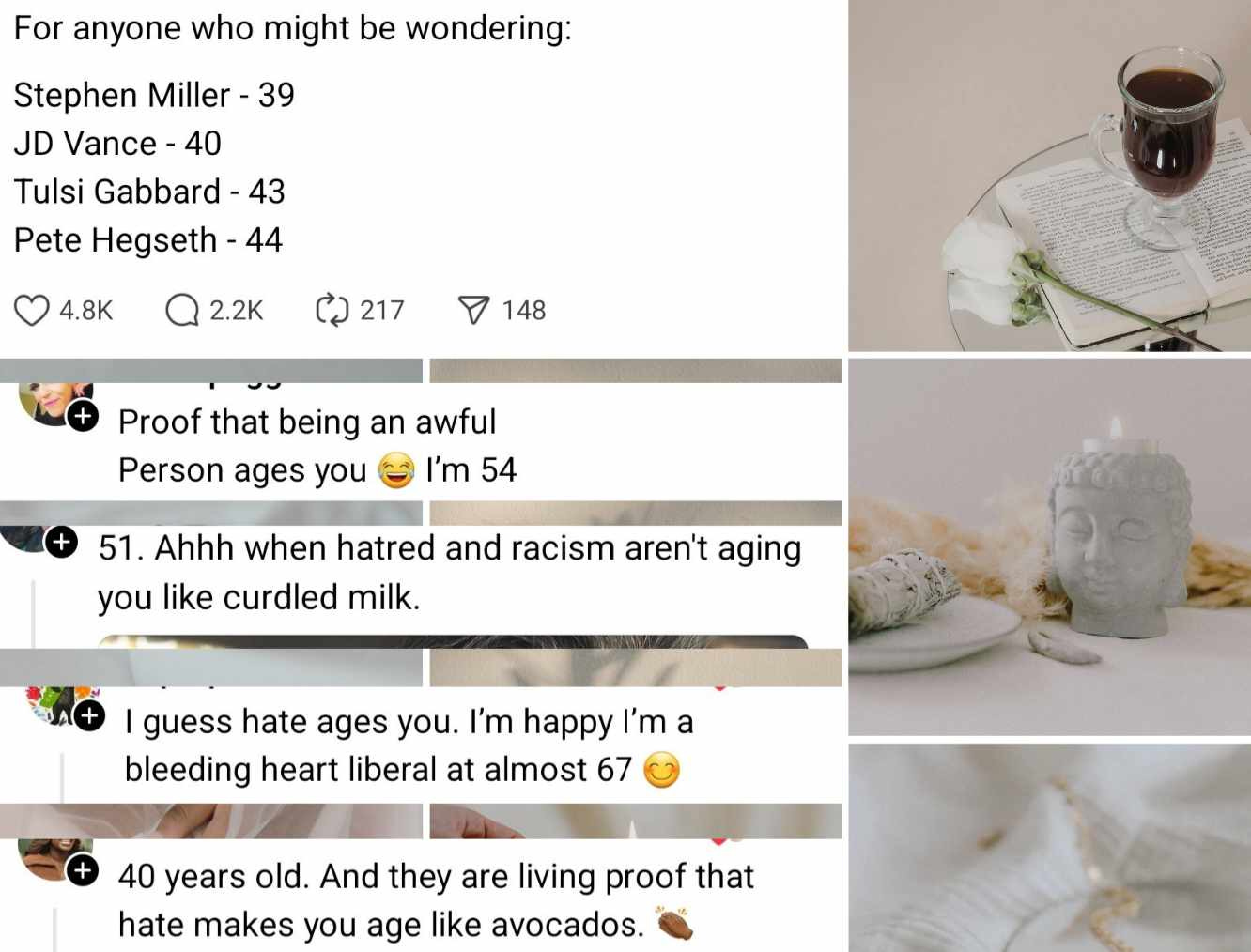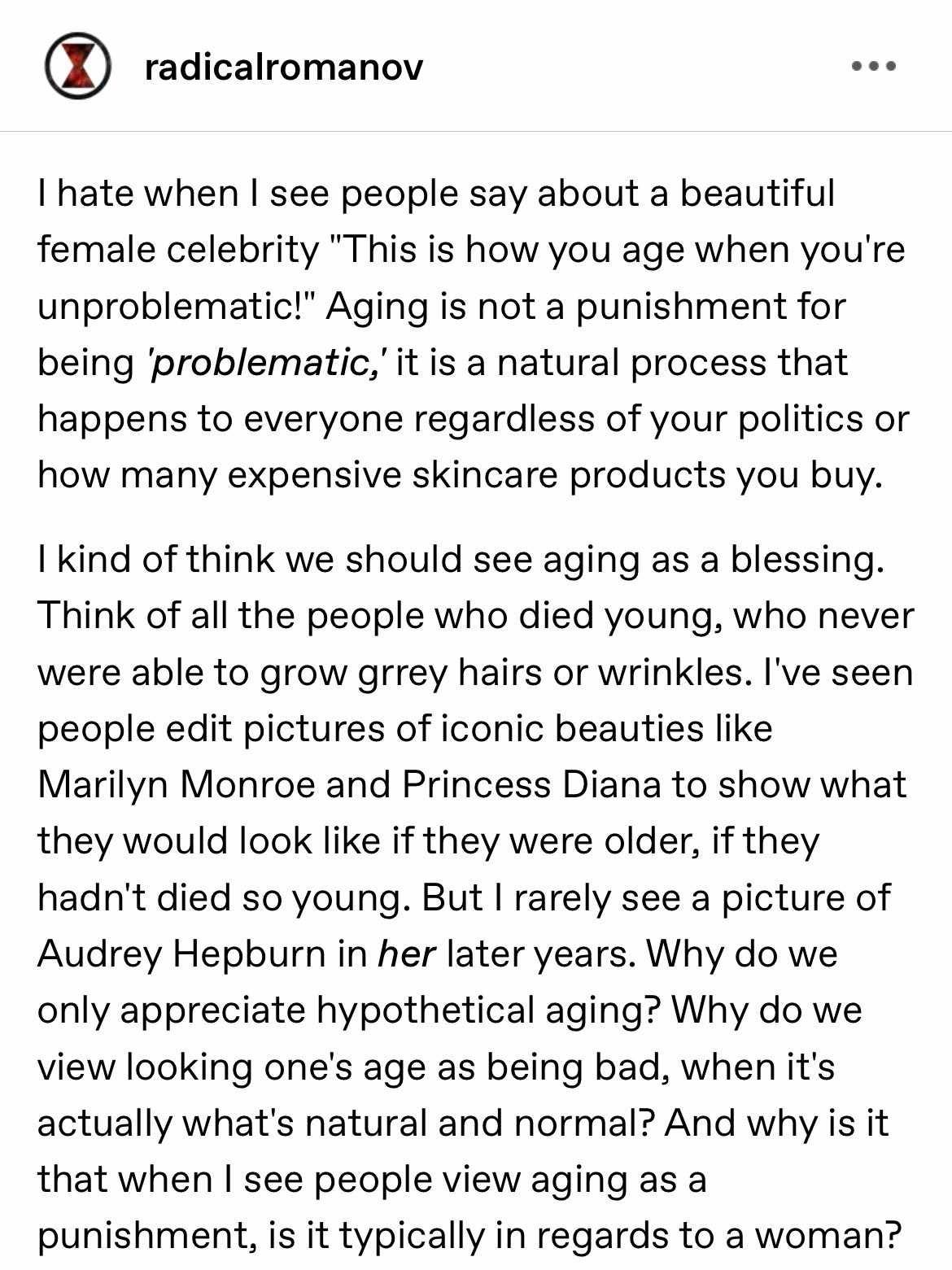What does "aging gracefully" even mean?
turning thirty, thinking about beauty culture, and wrestling with the morality of it all
I turned thirty this March, and left my twenties behind me forever.
I’ve been waiting for this. I’ve always said I was an old soul at heart— the chic coastal grandmother without the chic or the coastal. My hobbies are decidedly of the elder variety: knitting, sewing, baking diet-defying treats. My clothes are unfashionable pants paired with flowing cardigans and comfy knit shirts and strong, thick-rimmed glasses. My favorite books were written and published by people who died long before I was born, and my music taste has crossed over from “eclectic” to “decidedly uncool.” Like my namesake in Brooklyn 99, I have a favorite font (Garamond) and I own a documentary about spelling bees (Spellbound, 1999. You should watch it!).
Nevertheless, I still managed to have a few mini panic attacks about Getting Older over the last couple of months, and the crux of them all was something really dumb.
My hair is starting to go gray. The wrinkles around my eyes are… well, there. I’m heavier and less toned than I was ten years ago.
When I look into the mirror, I don’t see a gracefully-aging woman growing into maturity and wisdom with still-youthful skin, laugh lines that disappear with the right kind of matte poreless foundation (available at your pharmacy!), and a waistline that couldn’t possibly have borne two babies. I see someone who is getting older and looks it. I feel like Pam Halpert on The Office when she says, “I used to be young and cute and sorta funny... Now I’m just a fat mom.”
And that feels unfair, because I AM still sorta funny, and I am a good person. So this shouldn’t be happening to me, right?
Let’s back up.
I’ve loved Julie Andrews since I was four years old and first saw her snap, “Spit-spot!” at the Banks children on a worn-out library VHS tape of Mary Poppins. She is the epitome of talent, beauty, and grace. As she’s grown older (she’ll be ninety this year!) she’s retired almost completely from public and professional life, but whenever she makes a rare appearance on a talk show or receives a lifetime achievement award, everyone in the comments section on YouTube says a variant of the same thing. “What a Queen.” “I want to be her when I grow up.” “She’s aged SO WELL.” “Look how beautiful she still is.” “THIS is how you age when you are talented and generous and unproblematic— like a fine wine.”
Julie Andrews is the old lady we all want to be. Not a botched lip filler in sight— if she’s had work done (besides the infamous and tragic vocal cord surgery, of course) no one would know it. (And, of course, it’s not our business if she has. But we speculate anyway, don’t we?) Like Helen Mirren and Jane Seymour and Meryl Streep and anyone else who is Of a Certain Age and has hit that age with a “graceful” landing, Andrews looks recognizably like her youthful self but with more wrinkles and tasteful makeup. Yes, I googled “celebrities who have aged gracefully” to see what others’ consensus was. It’s not the weirdest thing I’ve searched for while writing.
People argue, of course, about what aging gracefully means. Does it mean embracing the changes in your face and letting them happen naturally? Does it mean letting hair go gray and perhaps even eschewing makeup (or at least visible makeup)? Or does it mean somehow, magically, keeping your youthful looks while giving no impression that you are holding onto them with anything other than the most delicate, feckless grasp?
A few weeks ago, I scrolled through Instagram in one of my ill-advised evening time-wasting sessions. (Listen, I want to be reading a book as much as the next overstimulated mom.) I stumbled across a Reel from a woman I later learned is a med spa professional (an important element, we’ll come back to this) highlighting some of the actors who had returned to Saturday Night Live for the show’s 50th anniversary.
“When you’re unproblematic with a strong sense of humor, you age accordingly,” she claims in the caption. “Proof that a sense of humor is anti-aging,” she reiterates in the text that appears over pictures of wealthy, successful, 50+ women who have access to the best beauty treatments available.
I have nothing against Amy Poehler or Kristen Wiig and their well-preserved, even youthful good looks. I’m happy for them! They’re funny, they look great, et cetera. But why are so many people still consciously or unconsciously subscribing to the idea that if you are talented, successful, “unproblematic” (read: not embroiled in any major scandal) you will soar into your golden years with mellow, enviable ease and effortlessly elastic skin.
This isn’t limited to women, by the way. Men are often referred to as “aging like a fine wine” but the word “unproblematic” crops up a lot too. (That’s Colin Firth in the below two images. Couldn’t we just say he grew into his good looks?!)
It goes in the other direction too, of course. I compiled a few responses to a popular post on Threads (and yes, I cropped out their photos/screenshots as best I could to protect their privacy since I’m kinda dunking on them here):
The first person shown here was listing the ages of several top names in the current presidential administration (this was clarified in a follow-up post, since the initial one didn’t explicitly say these numbers were their ages). It prompted a flood of snarky replies from people around this age or older, and nearly every single person chose to include a selfie with their response. To prove… what? To a group of like-minded thinkers that because they are a “good” person, they still look “good” for their age compared to Trump’s courtiers? That if you live a life of power-grasping, bigotry, and greed then the gods on Mount Olympus will strike you with wrinkles and male pattern baldness, and ensure that your blond is always bleached?
At what point did we revert to Medieval identity politics?
If you asked the average educated adult whether they believe beauty equals goodness, or whether a youthful (not necessarily beautiful) appearance indicates a pure heart, I don’t think most people would honestly say yes. We all know that we are not supposed to judge a book by its cover, that true beauty is found within, that man looks on the outward appearance but the Lord looks at the heart (1 Samuel 16:7). We know this, and yet… And yet! We still feel a certain smug satisfaction when Trump’s fake tan is visible on his collar when he wears the wrong color suit to a state funeral, when Marjorie Taylor Greene is called out in public for her bad hair dye job, when social media laughs at Elon Musk for his hair implants. We make a fuss over a vigilante murderer because he’s, pardon my French, fine as hell.
Perhaps we all need to reread Beauty and the Beast. I don’t know.
I’ve just turned thirty. By all reasonable calculations, at least a third of my life is probably over. But at the same time I am only thirty. There are far more wrinkles yet to come, more sagging bits and extra pounds and joints that don’t snap back when I land too hard from jumping off a playground swing. (Why did I do that last week? Who do I think I am?) There is also far more wisdom yet untapped, more life to embrace, a world that I cannot hold close enough. With all there is, why should I settle for just a piece of sky visible in a bathroom mirror?
I’m not here to disparage anyone who chooses to arrest aging by cosmetic means. Yes, I’m concerned by a consumerist mindset that is constantly attempting to sell people—mostly women—on the latest skincare product or cheekbone injectable, and I’m especially concerned by the insidious marketing used to convince women their natural aging process isn’t good enough. That Instagram Reel I mentioned above is from a cosmetic injector who makes a living off of “fixing” insecurities. But though I may raise an eyebrow at the people who are looking to make a quick buck off someone who is uncomfortable in their own skin, I’m not trying to paint with a brush as broad as the humor of the Three Stooges and denounce hair dye and Botox and facelifts in some kind of vanity-of-vanities moral imperative. I’m not even here just to butcher Edna St. Vincent Millay quotations juxtaposed with lyrics from Yentl. I’m just figuring out who I am, and wondering why in 2025 I live in a culture that prides itself on progressive thinking yet somehow still subscribes to a skin-deep view of reward for a life well lived.
In my grandmother’s bathroom there hangs a little painting of a dove flying over a meadow of brambles and long grasses. “Don’t regret growing older,” the motto at the top of the painting reads. “It is a privilege denied to many.” I used to read that picture over and over as a child and wonder what it meant. It didn’t occur to me to ask one of the many adults milling around the house at Thanksgiving dinner. It just took me years to puzzle it out for myself.
So what if I am salt-and-pepper by thirty-five, hoary-headed by forty? My grandfather was. His blood runs in my veins—well, his DNA in my chromosomes, at least— along with that of my great-grandmother on the other sides, whose wide German hips I inherited (much to my teenage chagrin). The freckles that dotted my mother’s arms, which I used to count absentmindedly as a child when she read aloud to me, are showing up on my own arms these days, and my four-year-old traces a finger along them sometimes. What a gift.
I don’t want my children to look back at my life someday, at my funeral, and say “well, she always stayed in great shape, and I never saw her without a full face of makeup, and her hair was brown and thick until the day she died.” Gracefully as she may be aging by any account, no one will say that about Julie Andrews, either. Instead, when she leaves this earth (I hope not for a long time!) the tributes to her life will be brimming full with the beauty she brought to people through her art: the music, the films, the stories she embodied.
Though my life and legacy won’t have anything near the same impact of Julie Andrews (nor would I want them to) I hope I can be remembered someday for what I brought to the world, too. Warts—and wrinkles—and all.
In the meantime, I’ll keep applying sunscreen nevertheless. Laugh lines are one thing, and skin cancer is another.








My gracious Aunt Teresa once gently told me to “embrace each season of life, with all the changes it may bring”. That wise advice was given to me in the early years of being a mom, and it’s been something I’ve had to remind myself of over the years.
You're beautiful!
sometimes I think that the only difference between mens' aging and womens' aging is owning it vs feeling it needs to be fought. idk!